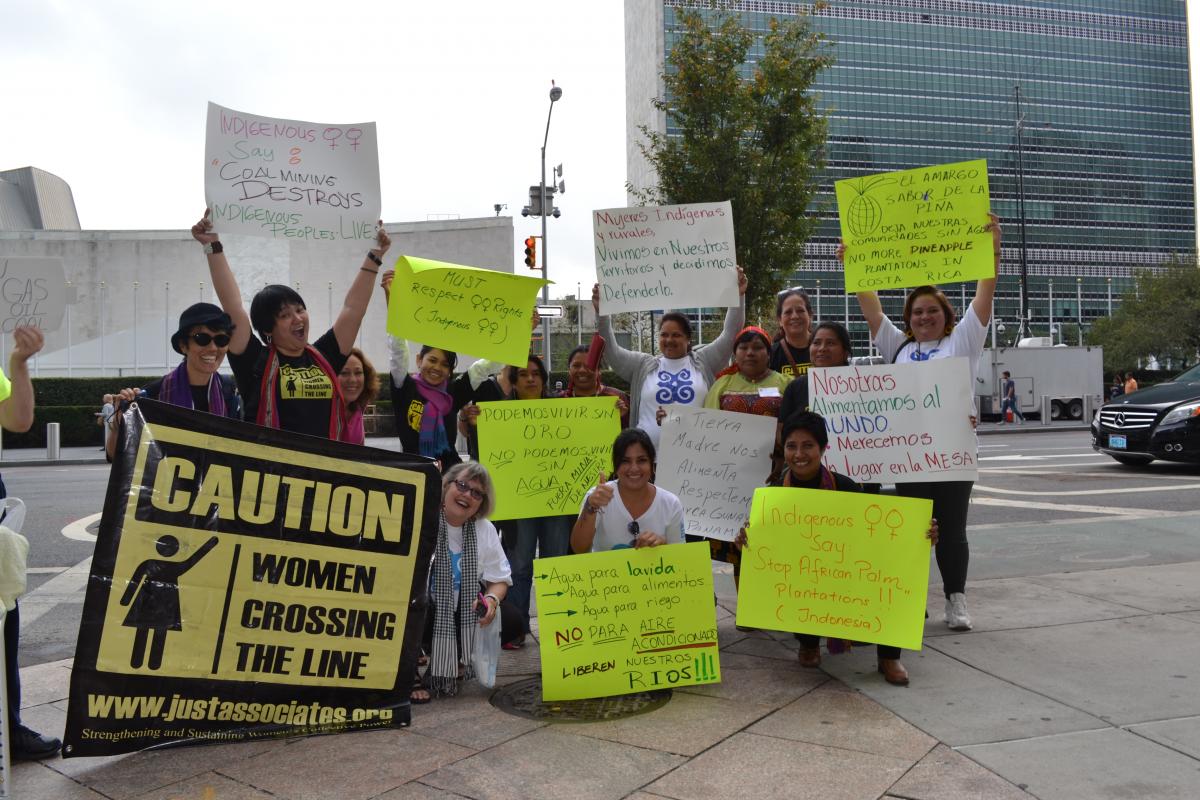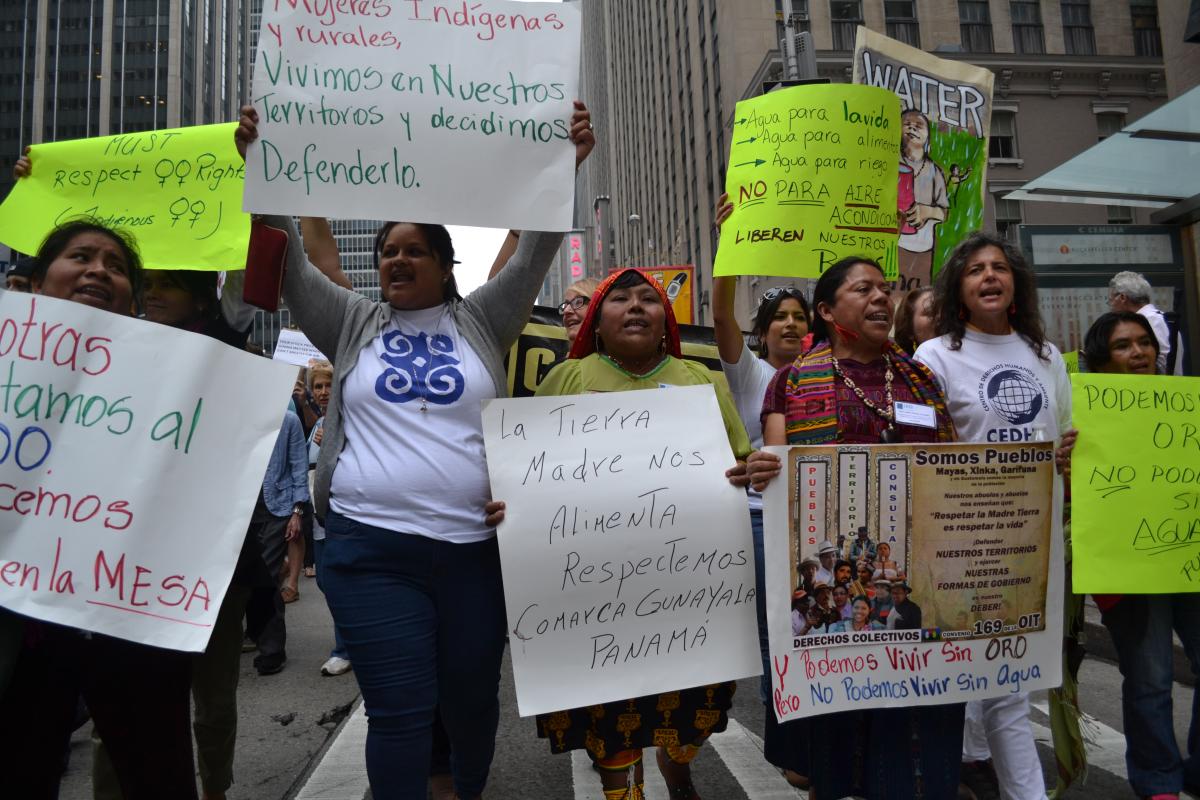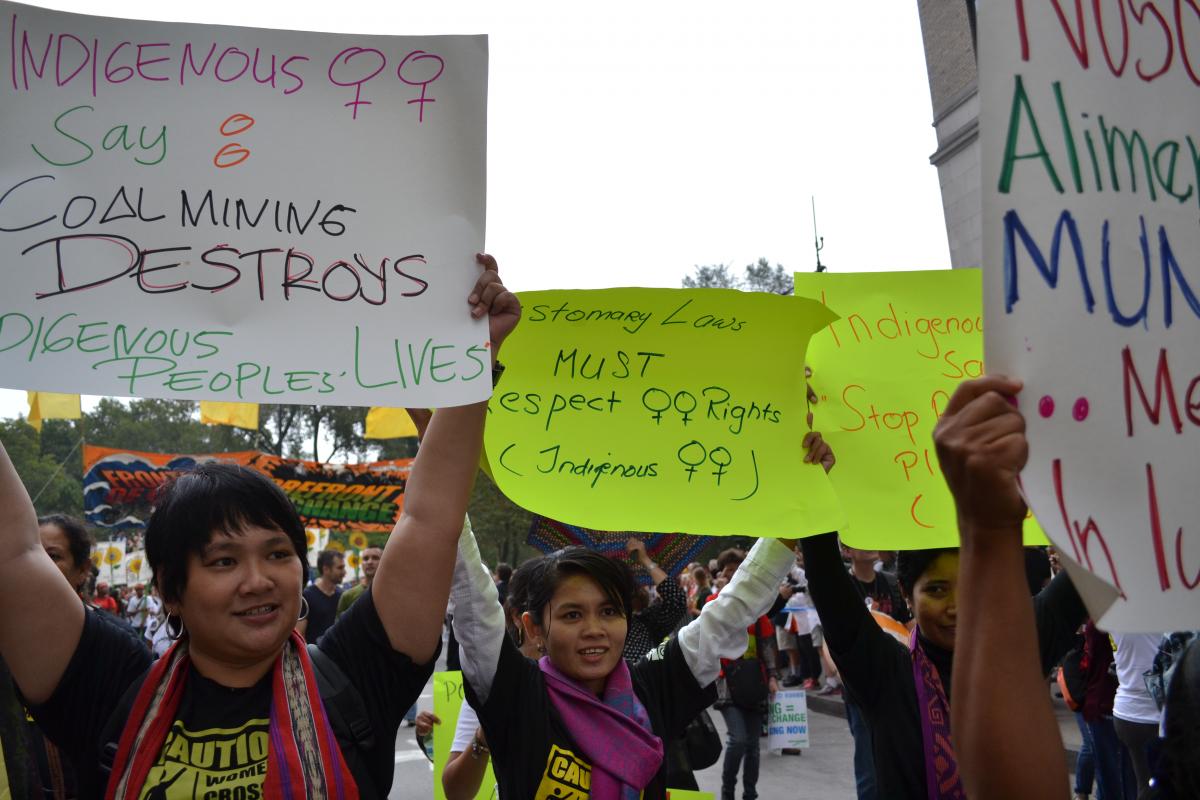In September, JASS Southeast Asia and JASS Mesoamerica converged in New York with a delegation of indigenous women leaders who have been part of our leadership schools and women human rights defenders strategies in both regions.Their convergence matched another—the UN World Conference on Indigenous Peoples, the People’s Climate March and other events—bringing together agendas and activism on climate change, indigenous people’s rights, women’s rights and peace. The region-to-region exchange, networking, and meetings with high-level officials, environmental activists, donors, and other indigenous communities helped form new bonds between women, new networks between people and JASS’ emerging agenda on women’s resource rights.
“If you want to see the face of indigenous peoples, you have to look at an indigenous woman. She is the face of what indigenous peoples go through,” said Olvy Octavianita Tumbelaka from Indigenous People’s Alliance of the Archipelego during a regional dialogue led by JASS Southeast Asia on the issues confronting rural and indigenous women in July 2014. Indigenous and rural women leaders are on the forefront of indigenous peoples movements’ efforts to defend their territories and natural resources against corrupt and illegal economic endeavors involving governments and corporate actors. Their courageous organizing strategies offer a glimpse of what people-centered environmental justice strategies look like in different parts of the world.
Issues Indigenous Women Face
 Indigenous peoples make up a large proportion of the poor and vulnerable population amidst the rich resources in the region. Several trends in Southeast Asia have had particularly dire impacts on the lives and livelihoods of indigenous and rural women. These include:
Indigenous peoples make up a large proportion of the poor and vulnerable population amidst the rich resources in the region. Several trends in Southeast Asia have had particularly dire impacts on the lives and livelihoods of indigenous and rural women. These include:
Land Grabs and Development projects: Under the guise of “development”, governments of Southeast Asia continue to promote and grant mining projects, logging operations, mega-dams, and other investment projects, both national and frequently transnational, that are having an enormously destructive impact on indigenous lands and lives.
How can one company occupy 6,000 hectares of land and yet they cannot present proof that they own the land? Multinational companies and transnational companies are very strong in Indonesia. And in Indonesian regulations, the government has the right to dispose of a land or to assign a piece of land to private companies.” ~ Marlien Elvira “Vivi” Marantika from Maluku province of Indonesia
Militarism in Indigenous Communities: The presence of military and armed forces in indigenous communities is common especially where there is organized local resistance against a “development” project. Governments also deploy troops in counter-insurgency operations under “national security laws”; too often the result is more violence.
“Eleven indigenous peoples are slain by government forces each year. These are brutal killings of indigenous men, women, and children from indigenous communities all over the Philippines.” ~ Piya Macliing Malayao, spokesperson of KAMP
Rape as a Tool of War: In militarized areas such as some of the parts the Philippines, Philippine military personnel sexually abuse women and girls. From 2010 to 2012, the Center for Women’s Resources has documented at least seven cases of abuse, ranging from sexual harassment to rape and gang rape by the Armed Forces of the Philippines’ (AFP) regular units and its paramilitary wing, the Citizens Armed Forces Geographical Unit (CAFGU). Most victims are minors and several have been indigenous women.
“People blame women in rape cases. So we help women speak up. There is domestic violence in our community but no one speaks about that.” ~ Mi Aim Pakao, Mon activist from Myanmar.
Many cases of rape by state agents such as the police and the military go unreported. In areas with large military presence, groups have documented an increase in the cases of rape, particularly in the Cordileras. According to Maria Ricca Llanes, the AFP specifically targets indigenous women, especially in villages where there is heightened resistance against “development” projects, to weaken the organized communities’ resolve.
Non-Recognition on Citizenship: According to the Asia Indigenous Peoples’ Pact (AIPP), many Asian states don’t recognize the existence of indigenous peoples within their territories, let alone their unique rights. States claim that all their citizens are “equally indigenous” to assimilate indigenous peoples into the mainstream national culture.Discrimination against indigenous communities, who are often perceived to be backward or against development, is rampant. Many government programs, like compulsory education or relocation programs, dilute indigenous culture and identity in the name of assimilation.
Women’s Resource Rights
 JASS Southeast Asia and JASS Mesoamerica have been working closely with indigenous women leaders for several years through the JASS leadership schools and women human rights defender strategies. With an eye toward building a shared resource rights agenda from a region-to-region exchange and the promise of making their voices more visible, JASS organized a delegation of indigenous women to New York in September to take advantage of the UN World Conference on Indigenous Peoples (WCIP) and the Peoples Climate Change March. The New York trip included high level meetings with UN and governments, strategy sessions with Greenpeace activists and with donors, interviews with the media, networking among indigenous peoples in meetings and while marching, and making deep connections across continents among women.
JASS Southeast Asia and JASS Mesoamerica have been working closely with indigenous women leaders for several years through the JASS leadership schools and women human rights defender strategies. With an eye toward building a shared resource rights agenda from a region-to-region exchange and the promise of making their voices more visible, JASS organized a delegation of indigenous women to New York in September to take advantage of the UN World Conference on Indigenous Peoples (WCIP) and the Peoples Climate Change March. The New York trip included high level meetings with UN and governments, strategy sessions with Greenpeace activists and with donors, interviews with the media, networking among indigenous peoples in meetings and while marching, and making deep connections across continents among women.
“Mapping the shared experiences and problems faced by indigenous women both in Southeast Asia and Mesoamerica was one of the most valuable lessons I learnt from JASS and WCIP spaces. It showed me that even though we as indigenous women are not part of formal decision-making processes at many levels, we bear much of the burden of its impact. Building from the collective power of indigenous peoples’ local experience, organizing indigenous women is not only strategic – it is imperative.” ~ Vivi Marantika
During this time, JASS also launched the 5th publication of the Making Change Happen series—Indigenous and Rural Women in Defense of Land, Territories and Women’s Rights. This issue offers information, concepts and reflections from women, not just for other activists concerned with these issues, but also for policymakers, leaders and others concerned with the pressing economic, political and environmental issues of our time.
JASS believes that indigenous and rural women’s strategies to build strong communities in the midst of powerful dislocating and destructive dynamics offer innovative solutions to some of the world’s pressing problems. Moving forward, JASS will continue its efforts to convene global exchanges and strategy meetings with indigenous women leaders from Mexico, Central America and Southeast Asia.
* This article was written with excerpts from the experiences of indigenous and rural women from Mesoamerica and Southeast Asia which were published in JASS publication Making Change Happen Issue Number 5: “Indigenous and Rural Women in Defense of Land, Territories, and Women’s Rights“


























